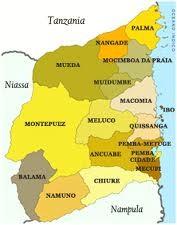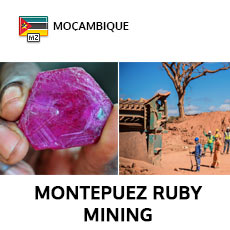 "This
is one of the paradoxes that is highlighted in the book" which will be
released on June 2, "O Cabo do Medo", declared or author, in an
interview with Lusa. Nuno
Rogeiro considers that, in the province of Cabo Delgado (northern Mozambique) -
the scene of 'jihadist' attacks associated with the Islamic State -, a Front
for the Liberation of Mozambique (Frelimo) "is currently holding a hot
potato in its hands very similar to the one that the Portuguese administration
had between [19] 61 and 74 ".
"This
is one of the paradoxes that is highlighted in the book" which will be
released on June 2, "O Cabo do Medo", declared or author, in an
interview with Lusa. Nuno
Rogeiro considers that, in the province of Cabo Delgado (northern Mozambique) -
the scene of 'jihadist' attacks associated with the Islamic State -, a Front
for the Liberation of Mozambique (Frelimo) "is currently holding a hot
potato in its hands very similar to the one that the Portuguese administration
had between [19] 61 and 74 ".
 A
province of Cabo Delgado, where natural gas megaprojects are planned, has been
the scene of several terrorist attacks, which are being claimed by the Islamic
State since June 2019. The attacks have already caused more than half a
thousand deaths and 162 thousand displaced people. .Next to Guinea-Bissau, it
was in Cabo Delgado that Portugal faced more resistance during a colonial war,
with bases not controlled by Frelimo and logistical support from neighboring
Tanzania. Between Palma, where gas exploration is planned, and Pemba, the
provincial capital, groups of Islamic fighters face opposing locals and
beheads, in a scenario of loss of central power that only begins in April with
more means ground. "How things come
down to more or less the same: which side are the people on?", Comments
Nuno Rogeiro, noting that "he does not win a subversive war against the
people".
A
province of Cabo Delgado, where natural gas megaprojects are planned, has been
the scene of several terrorist attacks, which are being claimed by the Islamic
State since June 2019. The attacks have already caused more than half a
thousand deaths and 162 thousand displaced people. .Next to Guinea-Bissau, it
was in Cabo Delgado that Portugal faced more resistance during a colonial war,
with bases not controlled by Frelimo and logistical support from neighboring
Tanzania. Between Palma, where gas exploration is planned, and Pemba, the
provincial capital, groups of Islamic fighters face opposing locals and
beheads, in a scenario of loss of central power that only begins in April with
more means ground. "How things come
down to more or less the same: which side are the people on?", Comments
Nuno Rogeiro, noting that "he does not win a subversive war against the
people".
In
the colonial war, "Frelimo, in a way, won politically because it managed
to win over part of the minds of Mozambicans", (photo on the right colonial army in the woods of C.Delgado 1970) a victory that it soon
alienated with the creation of re-education camps and a repression over
opponents that led to a civil war. Today, despite Maputo having "enough
security instruments, technical instruments and equipment" to deal with
Islamic fighters in the country's northernmost province, Frelimo "gives
the impression that it really forgot everything it had learned during the guerrilla
war "e" is in a situation today where he does not seem to understand
the guerrilla's mind ".
 "One
of the major problems for the security forces at the moment is to distinguish
who is who", to reduce the risks of civilian casualties, warned Nuno Rogeiro,
considering that Mozambique "must be more sophisticated, it must have more
means, more equipment and be more intelligent in the way of dealing with this
crisis ",(photo on the left guerrillas that liberated the country from colonialism).
"One
of the major problems for the security forces at the moment is to distinguish
who is who", to reduce the risks of civilian casualties, warned Nuno Rogeiro,
considering that Mozambique "must be more sophisticated, it must have more
means, more equipment and be more intelligent in the way of dealing with this
crisis ",(photo on the left guerrillas that liberated the country from colonialism).
"The
Mozambican army and the Mozambican police were transformed into forces of public
order" and showed that "they were not able to fight a guerrilla
war", considered the analyst. "Within Frelimo there is an awareness
that we will not win only with weapons not only because these weapons do not
exist, but also because it is impossible" to win without the support of
the population, warned the analyst. In his book, edited by Don Quixote, Nuno
Rogeiro explains the birth of what he considers to be the Islamic State
Province of Central Africa (EIPAC), which takes advantage of popular discontent
to try to control the province. The objective of the Islamic State is to make
"Cabo Delgado an independent state of Mozambique", taking advantage
of the chronic abandonment of the territory by Maputo. "Daesh is a hunter
of new talents and he found them in Mozambique", a country that they
consider to be the most favorable to the installation of a caliphate in East
Africa.
"They tried to take Pemba
and failed", but "they think they can live for a few years in that
central area between Quissanga to Palma", he maintained, adding: "It
is one of their dreams, to be able to live in a situation of chaos and impose
their law outside large urban centers ". This is "a conflict that
Mozambique was not expecting, but there are elements of hope", he said,
pointing out the decision of the natural gas exploration companies to remain in
place. The groups are born out of local discontent, but are guided and formed
from bases of Islamic extremism in the neighboring Democratic Republic of
Congo, which "turns the Mozambique problem into a regional problem".
The
"natural gas liquefaction industry makes this fight more comfortable for
Mozambique because it gives visibility" and ensures support channels, he
explained. On the other hand, if "Cabo Delgado was an area without any
strategic interest, it might not have Daesh's attention". But, to combat
this phenomenon, it is necessary to attack the root of the discontent,
increasing the weight of the State in the area and treating the population with
justice, ensuring the "distribution of income that will come from natural
gas", he warned. "Cabo Delgado is the poorest province, but the one
with the most wealth", he stressed.



0 comentários:
Post a Comment